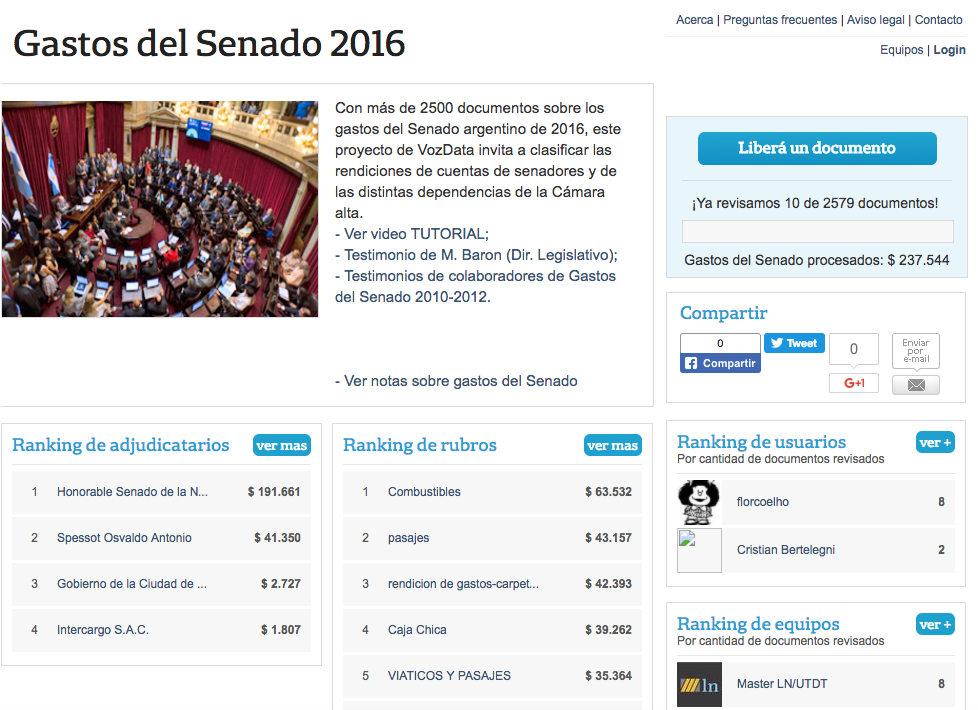
In 2010, political reporter Diego Cabot of Argentina’s La Nación received a leak with massive potential: a CD with 26,000 emails from the minister of transportation under then-President Cristina Kirchner. For two weeks, four La Nación journalists pored over thousands of documents by hand. But then the paper’s then-IT manager Ricardo Brom built a search engine that let journalists go through the leaked documents — and they had their first scoop within 40 minutes.
That investigation was a key moment for La Nación’s transformation into a powerhouse of Latin American data journalism. Momi Peralta, who was managing multimedia training and development at the time, said she’d been encouraged by the steam the open data movement was gathering in countries like the U.S. and U.K. She’d seen how major news outlets outside Argentina were increasingly putting resources to doing data-driven work.
“In early 2011, we organized a meeting with the management team and three interested journalists and formed the embryo of the data unit of La Nación,” Peralta said. “From there, we began to see all the opportunities of joining journalism and technology.”
 The data team, dedicated primarily to special projects, now includes six permanent members and is still led by Peralta. Their work has been recognized again and again, including winning major awards in each of the last three global Data Journalism Awards.
The data team, dedicated primarily to special projects, now includes six permanent members and is still led by Peralta. Their work has been recognized again and again, including winning major awards in each of the last three global Data Journalism Awards.
Many Latin American news outlets, like outlets everywhere, have laid off journalists in order to cut costs, but La Nación has considered its investment in a data journalism unit an efficient way of producing high-quality stories across multiple platforms — and to differentiate itself from its competitors. For Peralta, the success of the team — and its continued existence even in times of layoffs — is explained by the relevance of its work to the audience.
“We cover public policies, education, public spending, human development, the environment — themes that are not always the champions of pageviews, but that help build bonds of trust with communities,” she said. “We create services that help people understand and follow complex issues, like votes in Congress. And the more products we launch, the more efficient we become, because we keep updating the data and it stays relevant even after a long time.”
The connection with the audience isn’t one-way: Some of La Nación’s most recognized projects have involved crowdsourced investigations, driven by citizen participation. One was launched in 2015, shortly after the presidential primaries: With the electoral system under suspicion of fraud, the team made an open call for help looking through 90,000 poll worker reports, which were available as PDFs. With structured information pulled into a single dataset, the team’s analysis revealed that 48 percent of the monitoring reports included some type of irregularity.
Florencia Coelho, the data unit’s training manager and an open-source evangelist, led the investigation of the monitoring reports. She said the transparency and the collaborative spirit of the project strengthens the credibility of the newspaper: “A project of great impact like this can not be done alone. We have collaborated with hundreds of citizens, civil society organizations, and university student groups. It also adds credibility to the newspaper’s product. It is not ‘La Nación criticizing the government’ — it is society involved in what is of public interest.”
Another impactful collaborative investigation was the checking of 40,000 intercepted audio recordings relating to federal prosecutor Alberto Nisman, who was found dead in his home in 2015. He had been investigating the 1994 attack on a Buenos Aires Jewish community center that killed 85 people, the worst terrorist attack in Argentina’s history. In both cases, verification was possible thanks to an open collaboration platform developed by the data unit for collaborative checks of public documents. VozData, as the platform is named, is an example of La Nación’s strategy to develop software that can be used multiple times for distinct stories.

“We seek to be hyperproductive. We think of long-term projects,” Coelho said. “Weekly, we offer quality multiplatform content: for print, online, TV, social networks. We seek synergies to generate value to many sections of the newspaper, and this demonstrates that investing in data journalism in the long term is a good deal.”
The lean team has also focused on expanding the data culture for the entire newspaper. “It’s unfair to say that we are only six,” she said. “We are constantly growing and increasing in journalistic muscle, because other journalists see value in what we do and reach out. We are not a corner in the newsroom — we help generate a data-driven mentality internally.”
Seven years after helping those political reporters find the stories amidst thousands of emails, Ricardo Brom now spends almost all of his time on editorial projects, having turned from IT manager to data intelligence manager. He’s in-person proof of the shift in mentality that has put the newspaper in position as an international reference for data-driven investigations.
“What makes La Nación Data so successful is that it brings together people who are able to cover the entire data life cycle, from the retrieval to presentation,” he said. “We have a specialist in the access to information law who knows where to look for the data. We have a specialist in data mining; we have visualization specialists. And we also count on the work of Florencia and Momi to relate to different communities, bringing the culture of open data to public agencies and other spaces and showing the importance of this to produce better journalism and have a more informed society.”
To stay at the forefront of data journalism, the team counts on trainings, hackathons, conversations with experts, and participation in international hacking events and open data efforts. These activities, Coelho said, help generate a virtuous cycle between journalists and civil society: “It’s something that takes a lot of energy, but we think it’s important. We have a role that is almost like an NGO. We build and open databases, break with the exclusivist paradigm — we even train competitors!” she said laughing.
Looking at other data teams in Latin American newsrooms, Coelho points to smaller outlets Ojo Público and Convoca, both of Peru, as evidence that it doesn’t take a large investment to make quality data journalism. For her, it’s more important to create a culture that encourages learning and the exchange of knowledge. “It is necessary to seek allies, and the allies are not always inside the newsroom. Sometimes it is a group of activists who can help, a programmer interested in public transparency. There is no impossible project if we apply technology and collaboration. This is in the DNA of La Nación Data and is what makes us what we are today.”
A version of this story was published at the Knight Center for Journalism in the Americas.